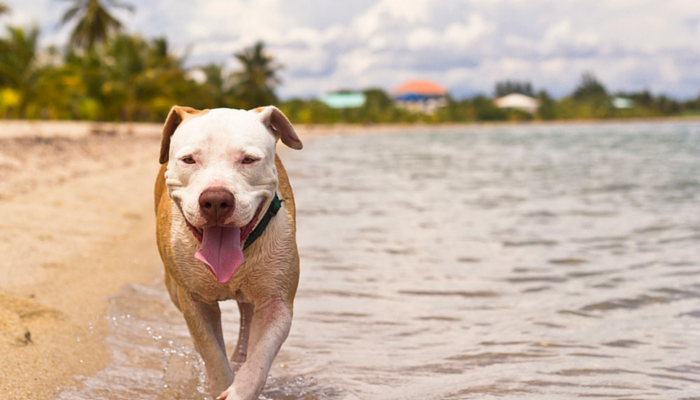With summer having arrived in Ballina, I can guarantee that your pet has noticed things starting to heat up. Unfortunately some pet owners do not realise how easy it can be for our animals to overheat. If they are not able to cool properly it can lead to heat stress or heat stroke. This can occur all year around, even in milder conditions, however; as vets we tend to see more cases in the summertime. There is a very short amount of time from noticing the first clinical signs in your pet, to life threatening multi organ damage. Read below to see how you can enjoy these summer days with your pet, without taking any unnecessary risks.

Dogs and cats are unable to sweat like humans, instead they release heat through other means, one main way being through the pads on their feet. You may also have noticed dogs panting more when they are hot. Panting works through the process of evaporative cooling across the moist mucous membranes of their mouth and nose. Humidity will impair their ability to cool efficiently and there is increased risk when the humidity is above 35%. Once greater than 80%, their ability to cool via evaporation is gone altogether.
Increased risk factors for heat stress/stroke include:
- age; young and old animals are not as efficient at regulating their body temperature
- breed; brachycephalic (flat faced) breeds such as pugs, boxers and bulldogs have a decreased ability to cool air due to the anatomy of their respiratory system. Also large / giant breeds
- medical conditions such as obesity, heart disease or respiratory disease
- exercising on warm and humid days. Temperatures greater than 20 degrees celsius will impair their ability to cool
- confined spaces such as dogs being left in cars or pocket pets such as mice and rabbits, as they are often in small enclosures unable to escape the heat
What to do if you think your pet may have heat stress?
- stop anymore physical exertion such as exercise, playing with toys or removing them from stressors
- relocate them to a cool area, such as a shady spot or air conditioned room.
- ensure cool water is easily accessible
- wet their coat with cool (not cold) water. Cold water and ice packs can constrict blood vessels which actually prevents effective cooling
At this stage, if an animal is unable to cool themselves efficiently enough, the heat stress will progress into heat stroke. Weakness, hypersalivation, vomiting, diarrhoea, seizures and collapse can all be signs of heatstroke which can be fatal. If you suspect your pet may be experiencing signs of heat stroke, always seek veterinary attention as soon as possible! It is estimated that less than 30% will survive if they present for treatment greater than 90 minutes from the onset of their clinical signs. There is also no increased survival rate between patients who were cooled prior to arrival at hospital and those that weren’t, so please everyone- get them in quick so we can start supportive treatment immediately!
9 Tips to Keeping Cool this Summer

- Provide access to a well ventilated space with shade and unlimited fresh drinking water.
- Cooling beds or a shell pool to stand or lay in can be ways to add extra relief.
- Frozen treats or better known as pupsicles provide not only a way for our pets to cool down but also a stimulating activity and a high valued reward. Get creative by adding different fruits or treats your pet enjoys, add to an ice cube tray or container and freeze!
- Regular grooming; including brushing to remove loose hair and clipping to keep coats short allowing heat to escape.
- Never leave your pet in a car or direct sunlight as temperatures can rise rapidly.
- Keep exercise to a minimum on warm days. Do not walk them on surfaces such as cement, bitumen etc.
- Protect from UV rays- especially those that like to sunbake or have fair skin. It can lead to skin diseases or cancer. There are special dog sunscreens you can use or for the cool kids check out the Bromelli sunsuits!
- CATS DO NOT PANT! If you notice that it appears your cat is panting please seek veterinary attention immediately as this is usually an emergency and less likely to be heat related.
- Most importantly remember to have fun !






